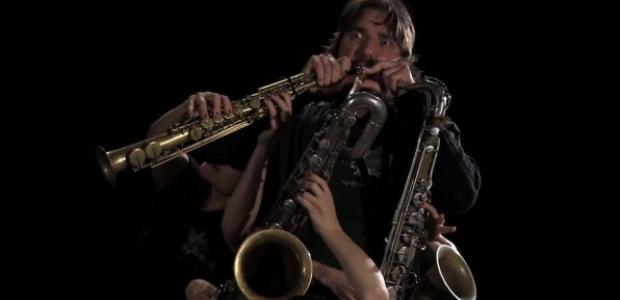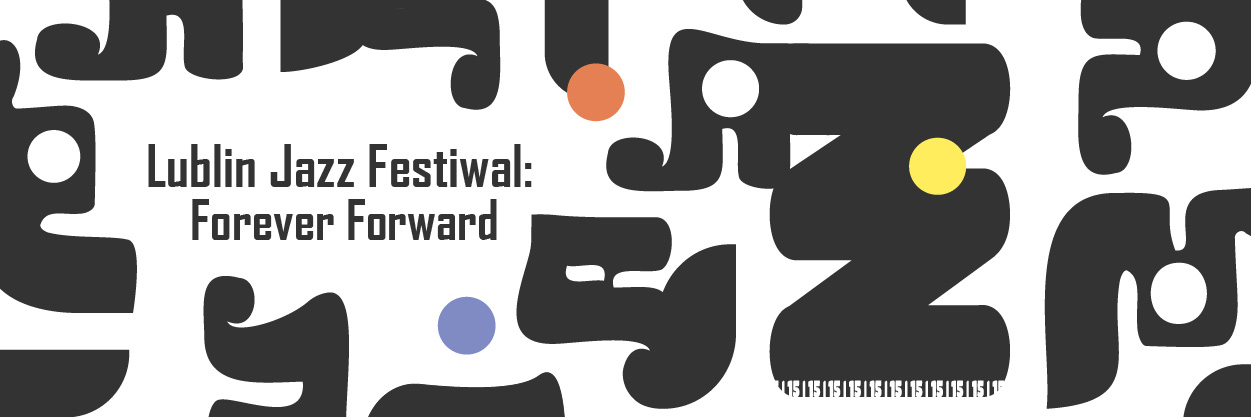Yedo Gibson – There are two kinds of music: the one that is happening and the one that is not happening

Brazilian saxophonist Yedo Gibson is certainly one of the most intriguing improvisers of the young generation. For years residing in Europe (first Amsterdam, now around Lisbon), with a few albums has already strongly marked his presence on the stage of free jazz music or free improvisation. Three of them even found their editor in Poland. Exactly this friday there will be world premiere of the third of them - "Multiverse", recorded together with his Portuguese friends - Gonçalo Almeida and Vasco Furtado. The saxophonist will be a guest of the "Drumming Now!" Festival in Poznań. and "Musica Privata" in Łódź. Both of them are starting this week. Before we listen to Gibson alive, we invite you to read the interview conducted with the musician during the last days.
Hello, Yedo. In the coming days, the third album with your participation will be released in the Multikulti Project/ Spontaneous Music Tribune Series. You come with Vasco Trilla for several concerts to Poland. If I remember correctly, it will not be your first visit here. You've been playing concerts in this part of Europe. Is it right?
Hello Andrzej, yes, it's not my first time in Poland, I've been there three times, played in several places and had lots of vodka! Once with Naked Wolf, and the other two times with Vasco. He is a deep lover of Polish culture, probably knows more about Polish cinema than most of the Polish people, he introduced me to Poland. The first time we went to Poland together we played all over the place, it was fantastic to meet so many great people. We were so well received in Łódź that it has become my favorite Polish city. I mean we had Paweł Sokołowski and his crew giving us polish traditional dance lessons but them in Warsaw was also great on Kalambur and in Krakow... I love it all.
Let's talk about these three CDs ("Antenna", L3, "Multiverse"). Each is different, it seems to me that everyone finds a point of attachment for the process of improvisation elsewhere. It has a different idea for entry. Could you comment on any of them?
“Antenna” is my duo with Vasco that I have always on my heart. When I first met Vasco we played for a week in Barcelona, second time I saw him we booked a tour with almost 20 concerts, in 2 years we had made 180 concerts together. It is for me the easiest way to make music (in duo with Vasco Trilla). About L3 - I had this idea for a long time on how to develop structure with sounds but at the same time keeping the energy level up. It came from my first European trio EKE with Gerri Jager (drums) and Oscar Jan Hoogland (clavichord). I just wanted to have this concept in a more radical form so I called trumpeter Luis Vicente to join the duo with Trilla.
“Multiverse” is extremely different than the other two records. Gonçalo Almeida and Vasco Furtado came to my small village in Sintra to play with me and somehow the music went in a completely different direction and therefore we had to record so we went to the SMUP and did this record. I am always fascinated to play with musicians that can turn my neck to different directions and that is what this two guys keep doing to me.
Trilla, asked by me on the occasion of the album "Antenna", how he would describe relationship with you in music and improvisation, he replied: "We are one!". What is most important for you when you enter the stage or the recording studio? What makes a concert really successful?
The sound is vibration of air, there is a moment on music where you become part of this vibration and you can lead it or even decide to let it lead you. That is when you know you are in the good track, it's not just getting the flow, it's been in the flow but also totally aware of space, time and possibilities.
Han Bennink would say "there are two kinds of music - the one that is happening and the one that is not happening". I would say that when “it is happening” you are inside and outside of it and completely aware of its needs.
Do you have any favorite stage situations? Do you prefer a duo or larger ensembles? And instruments? When do you reach for a soprano saxophone or a frula, and when for a tenor or a baritone? What determines your choice?
I normally see the music as a way to move the air inside of a room and that works the same way to duos or large ensemble. What changes is the capability to move, on a duo it can take any direction in every millisecond and on a large ensemble is takes longer, it’s like riding a BMX or a huge boat.
I do have a passion for drums, I started playing free with my uncle Panda in Brazil and my brother, both drummers, so it’s an instrument that some how is a huge part of me. Maybe that is also how I could understand the world of Vasco so easily.
I never choose the instruments, normally it comes from the air of the room.
Let's return to your next visit to Poland. You will play, among others at the “Musica Privata” Festival in Łódź, and earlier you will spend three in Poznań, participating in the “Drumming Now!” Festival in the Dragon. You will play a duet with Vasco, also we would like to see you in another duo with electric guitar. It is also anticipated that you will conduct the Poznan Improvisers Orchestra. Do you have any experience in this field? Do you like playing in large ensembles that improvise?
I never planned anything with Vasco, we only play music…
About large ensembles… I was the founder of the Royal Improvisers Orchestra in Amsterdam. I was running it for 10 years, we were around 20 musicians and we played with the London Improvisers Orchestra, with Phil Minton, Han Bennink, Steve Beresford. And I even took this ensemble all the way to Brazil. I had all those marvelous musicians that were rehearsing two times per week, for all this time it was a huge process that went from conduction until they were able to just improvise and create pieces on the spot without having to follow the líder. It was an amazing experience to me.
What methods of communication with the band do you use during conducting? Do you use any notification? For a graphic design? Or you just gesturing like Ivan Gonzalez?
With The Royal Improvisers Orchestra I used initially what I learned during my staying in London with The London Improvisers Orchestra but I never liked to be the only one making decisions. After four years I decided to abandon the hand signals and then the orchestra had already found a way to improvise together with the same goals.
Describe to us what was your creative path to becoming an improvising musician. Has anyone particularly inspired you? Have you modeled yourself on somebody at the beginning of this journey?
That is a funny story, my uncle Panda on his 55 years stopped to play on public and decided to only practice with the goal to play jazz like an American. So he was putting some jazz records and playing together with it. Every time I would met with him he would ask me to practice with him. And I always ran from playing with records on so one day I told him - ok let’s play but not with records only the two of us. We played for two hours without stopping and thought that we had invented a new kind of music. And we decided to play together every day and we did it for few years. Two years later Panda got a recordings of “Interstellar Space” and when he played the record to me I asked him when did you record us playing?! And he said that it was John Coltrane and Rasheed Ali, almost 50 years earlier. So we invented free jazz and later discovered that someone did it much earlier!!
You come from Brazil, you spent a lot of time in Amsterdam, now you live near Sintra, not far away from Lisbon. Could you compare these three places on the ground from the point of view of improvising music, the possibilities it creates for development, for playing music, and for living in general?
Amsterdam always has had full of subsidies for music and became a great improvisation scene with the ICP Orchestra, but after that for many years it was a empty place besides the older musicians. On the last 10 years a lot of young musicians have moved to Amsterdam and that gave the scene a new impulse and its a great place to be at the moment. Brazil has a huge musical culture but not much to do with this music. We had to fight a lot to just have the right to exist. And Portugal is now also a funny place. They have some great labels there but the musicians are very divided between their bubbles. I hope that it will change and the musicians will be more friendly to each other so that the music can be developed together. When this little point get changed, it will become a free improv tropical paradise.
Thank you for conversation!
- Aby wysyłać odpowiedzi, należy się zalogować.







